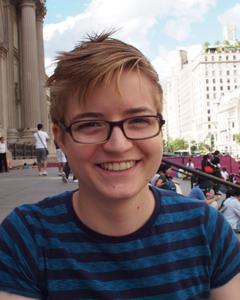ESP Biography
BONNIE KREJCI, PhD student in linguistics
|
Major: Linguistics College/Employer: Stanford Year of Graduation: 2017 |

|
Brief Biographical Sketch:
I'm a native Texan who came to Stanford for a PhD in linguistics. My interests are in syntax (word order and word formation), semantics (word meaning and sentence meaning), language typology (similarities and differences across languages), and sociolinguistics (how language and society interact). I've worked on languages spoken in the US, Central Asia, South America, and India. Before I decided to study linguistics, I taught English/Language Arts to ninth graders. Splash gives me the opportunity to work with high schoolers again! Outside school, my hobbies are rollerblading and cooking things that are not waffles in waffle irons. Past Classes(Clicking a class title will bring you to the course's section of the corresponding course catalog)R4313: Linguistic Taboo in Splash Spring 2015 (Apr. 11 - 12, 2015)
Why are some English words considered profane or deeply offensive, while others can be used in any situation? How has this changed over time? What kinds of words are considered offensive in other languages?
In this class, we will examine the social contexts and situations where certain words are off-limits, with the broader goal of understanding the relationship between language and culture.
While we will be discussing words that are sometimes unacceptable in a classroom situation, no student will be asked to use words that make them uncomfortable. Students are expected to conduct themselves maturely, approach the subject material thoughtfully, and be respectful of the diverse opinions and experiences of their classmates.
R3866: Language Myths, Language Truths in Splash Fall 2014 (Nov. 08 - 09, 2014)
Have you heard that the Eskimos have over 100 words for "snow"? That women talk three times as much as men? That some apes have learned to use American Sign Language? Have you heard that people who use slang or bad grammar are lazy?
In this class, we explore the origins of these myths, look at the empirical evidence that refutes them, and discuss how language myths can contribute to racism, sexism, and other forms of prejudice. Students leave the class with an understanding of how linguists determine what is true and false about how language works.
R3689: Language Around the World: Introduction to Linguistic Typology in Splash! Spring 2014 (Apr. 12 - 13, 2014)
Does every language have nouns, verbs, and adjectives?
What kinds of sounds do different languages use?
Why do some languages have different word orders than others?
Linguistic typology attempts to answer these questions -- to discover which properties of language are universal and which can vary across languages.
In this class, we'll work together to solve linguistic puzzles from English, Spanish, Hindi, and Native American languages, gaining a better understanding of the complexity and diversity of human language.
|
|
